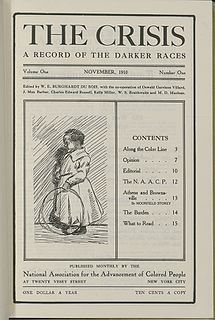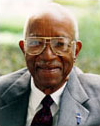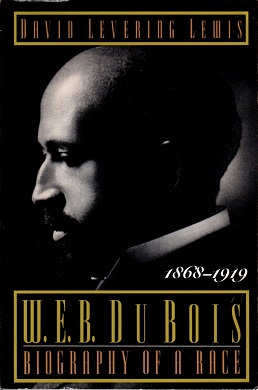
The Pulitzer Prize for Biography is one of the seven American Pulitzer Prizes that are annually awarded for Letters, Drama, and Music. It has been presented since 1917 for a distinguished biography, autobiography or memoir by an American author or co-authors, published during the preceding calendar year. Thus it is one of the original Pulitzers, for the program was inaugurated in 1917 with seven prizes, four of which were awarded that year.

William Edward Burghardt Du Bois was an American sociologist, historian, civil rights activist, Pan-Africanist, author, writer and editor. Born in Great Barrington, Massachusetts, Du Bois grew up in a relatively tolerant and integrated community, and after completing graduate work at the University of Berlin and Harvard, where he was the first African American to earn a doctorate, he became a professor of history, sociology and economics at Atlanta University. Du Bois was one of the founders of the National Association for the Advancement of Colored People (NAACP) in 1909.
Pulitzer Prizes were first presented in 1917. There were initially four categories; others that had been specified in Joseph Pulitzer's request were phased in over the next few years. The winners were selected by the trustees of Columbia University. The first Pulitzer Prize winner, French Ambassador Jean Jules Jusserand, who had written the best book about American history, won $2,000. Herbert Bayard Swope won a $1,000 prize for reporting.

The Crisis is the official magazine of the National Association for the Advancement of Colored People (NAACP). It was founded in 1910 by W. E. B. Du Bois (editor), Oswald Garrison Villard, J. Max Barber, Charles Edward Russell, Kelly Miller, W. S. Braithwaite, and Mary Dunlop Maclean. The Crisis has been in continuous print since 1910, and it is the oldest black oriented magazine in the world. Today, The Crisis is "a quarterly journal of civil rights, history, politics and culture and seeks to educate and challenge its readers about issues that continue to plague African Americans and other communities of color."
Lewis Burwell Puller Jr. was an attorney and a former United States Marine Corps officer who was severely wounded in the Vietnam War. He won the 1992 Pulitzer Prize for Biography or Autobiography for his autobiography Fortunate Son.

Shirley Graham Du Bois was an American author, playwright, composer, and activist for African-American and other causes. She won the Messner and the Anisfield-Wolf prizes for her works.
The 2001 Pulitzer Prizes were announced on April 16, 2001.
The following are the Pulitzer Prizes for 1994.
William Shield McFeely is an American historian. He retired as the Abraham Baldwin Professor of the Humanities emeritus at the University of Georgia in 1997, and has been affiliated with Harvard University since 2006.

John Hope Franklin was an American historian of the United States and former president of Phi Beta Kappa, the Organization of American Historians, the American Historical Association, and the Southern Historical Association. Franklin is best known for his work From Slavery to Freedom, first published in 1947, and continually updated. More than three million copies have been sold. In 1995, he was awarded the Presidential Medal of Freedom, the nation's highest civilian honor.
Rebecca Diane McWhorter is an American journalist, commentator and author who has written extensively about race and the history of civil rights. She won the Pulitzer Prize for General Non-Fiction and the J. Anthony Lukas Book Prize in 2002 for Carry Me Home: Birmingham, Alabama, the Climactic Battle of the Civil Rights Revolution.
Arnold Rampersad is a biographer and literary critic, who was born in Trinidad and Tobago and moved to the US in 1965. The first volume (1986) of his Life of Langston Hughes was a finalist for the Pulitzer Prize and his Ralph Ellison: A Biography was a finalist for the 2007 National Book Award.
Leon F. Litwack is an American historian whose scholarship focuses on slavery, the Reconstruction Era of the United States, and its aftermath into the 20th century. He won a National Book Award, the Pulitzer Prize for History, and the Francis Parkman Prize for his 1979 book Been In the Storm So Long: The Aftermath of Slavery. He also received a Guggenheim Fellowship.

W. E. B. Du Bois High School of Environmental Science was a public high school located in northeast Baltimore, Maryland. The school was named after sociologist and civil-rights activist Dr. W. E. B. Du Bois. The school was situated in the former Northern High School and shared the structure with the Reginald F. Lewis High School. The school was closed in the summer of 2015 by Baltimore City Public Schools as part of its 21st Century Building project.
William Andrew Swanberg was an American biographer. He may be known best for Citizen Hearst, a biography of William Randolph Hearst, which was recommended by the Pulitzer Prize board in 1962 but overturned by the trustees. He won the 1973 Pulitzer Prize for Biography or Autobiography for his 1972 biography of Henry Luce, and the National Book Award in 1977 for his 1976 biography of Norman Thomas.
The Atlanta compromise was an agreement struck in 1895 between Booker T. Washington, president of the Tuskegee Institute, other African-American leaders, and Southern white leaders. It was first supported, and later opposed by W. E. B. Du Bois and other African-American leaders.
Louis Rudolph Harlan was an American academic historian who wrote a two-volume biography of the African-American educator and social leader Booker T. Washington and edited several volumes of Washington materials. He won the Bancroft Prize in 1973 and 1984, once for each volume, and the 1984 Pulitzer Prize for Biography or Autobiography for the second volume.

T. J. Stiles is an American biographer who lives in Berkeley, California. His book The First Tycoon: The Epic Life of Cornelius Vanderbilt won a National Book Award and the 2010 Pulitzer Prize for Biography or Autobiography. His book Custer's Trials: A Life on the Frontier of a New America received the 2016 Pulitzer Prize for History.

W.E.B. Du Bois: Biography of a Race, 1868–1919 was written by historian David Levering Lewis and published in 1994 by Henry Holt and Company. The book studies the early and middle years of Du Bois's life. It is the first in a two-part biography of W.E.B. Du Bois. It won the Pulitzer Prize for Biography in 1994, as did Lewis's second installment, W. E. B. Du Bois: The Fight for Equality and the American Century 1919-1963, winning the Pulitzer in 2001.








